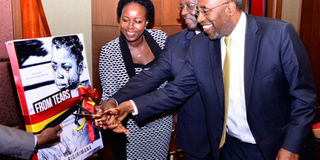Prime
Registration bureau to tackle copyright law bottlenecks

Prime Minister Ruhakana Rugunda (right), permanent secretary in the Ministry of Gender Pius Bigirimana (centre) and his wife, Elizabeth, launch a book at Sheraton Kampala Hotel early this year. PHOTO BY ERIC DOMINIC BUKENYA
What you need to know:
Consultations. Although the process has not yet started, officials are looking forward to make changes based on what the users would like to have.
Kampala.
The Uganda Registration Services Bureau is working on a programme to address the low understanding of the copyrights law in the country.
According to Ms Fiona Bayiga, the director Intellectual property at URSB, among some of the suggestions by the URSB directorate, is amending the law to focus on areas that need to be changed to reflect on the needs of the moment.
“Consultations have not yet begun because we have to start the process of procuring the consultant first. I cannot talk about what amendments, but we shall be looking at what the users would like to have,” Ms Bayiga said yesterday during a workshop at the offices in Kampala.
The understanding of copyright laws have been low on account of low level of awareness of the intellectual property and laws being too complicated for the common man to understand.
“There are artistes in Uganda who are earning much less than they should be able to earn from their work. This is the first with the copy right area but we shall move out to the regions as well,” Ms Jane Okot P’Bitek Langoya, the deputy registrar general of URSB, said.
Mr James Wasula, the chief executive officer of the Uganda Performing Rights Society, said the sensitisation workshop has been long overdue for the artistes.
“We have people carrying titles that they don’t understand what they mean,” he said.
Mr Wasula welcomed the amendment of the property right law and also increased sensitisation of the masses to promote a clear understanding of the law.
“This is the beginning of putting things in the right directions,” he said.
Other artistes such as Mr Francis Mutesasira of the Sauti ya Africa music group, said people do not understand the Intellectual Property Rights law and as such many have lost money to promoters who make money off their work.
Among the challenges facing the low Intellectual Property Rights uptake has been the high costs being charged by the gazette to have the musicians and performers gazette their show.
Mr Bayiga says they charge Shs50,000 to register a copyright, but the gazettes charge Shs450,000 to have it advertised, a cost for the public.
Ms Langoya says the bureau has seen an increase in people registering their businesses due to the Competitiveness and Enterprise Development Project, a government/World Bank-funded project.
“Through the project, we were able to decentralise the registration process for businesses and patents. For instance, the people who operate in downtown who were afraid of coming to Amamu House to register their businesses all now go the new points at Posta house and Nakivubo which have also worked a lot in reducing the queues at the head office,” she said.
“We have also gone into the electronic document management system which will digitise all records, making it easy for people to transact online from the comfort of your office. It will not matter which part of the country you’re in. The bureau is also planning to set up a one-stop centre for business registration,” Ms Langoya says.
extend upcountry
At the moment, URSB is mainly operating in Kampala but the government has provided money to open up registration bureaus in 34 municipalities around the country. “We are moving out and by the end of this year we should have covered all those. This year, we are mainly concentrating on sensitisation and we are targeting up country areas as well,” Ms Langoya says.




